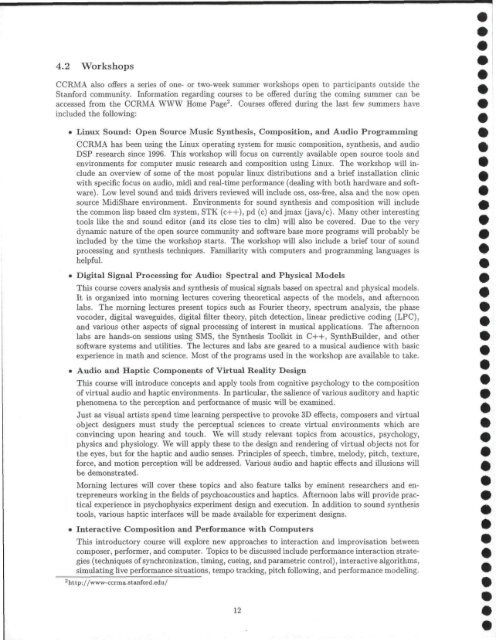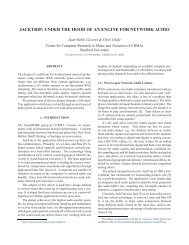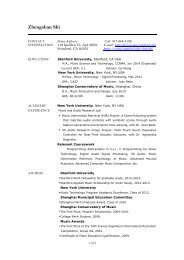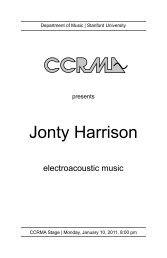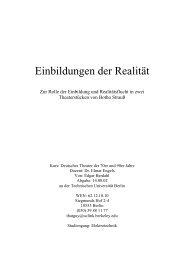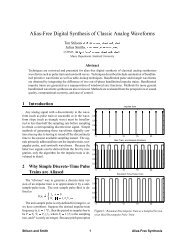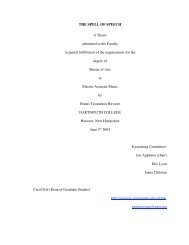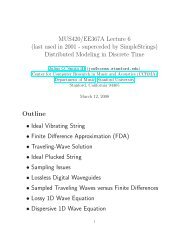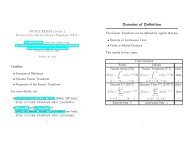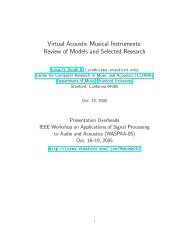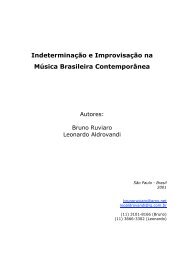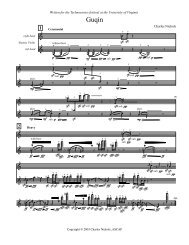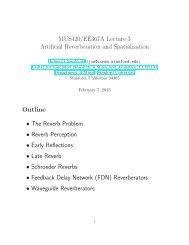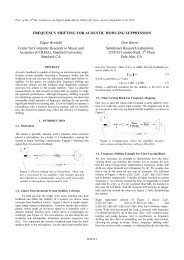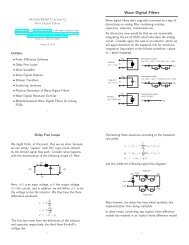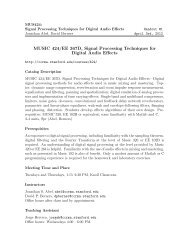CCRMA OVERVIEW - CCRMA - Stanford University
CCRMA OVERVIEW - CCRMA - Stanford University
CCRMA OVERVIEW - CCRMA - Stanford University
You also want an ePaper? Increase the reach of your titles
YUMPU automatically turns print PDFs into web optimized ePapers that Google loves.
4.2 Workshops<br />
<strong>CCRMA</strong> also offers a series of one- or two-week summer workshops open to participants outside the<br />
<strong>Stanford</strong> community. Information regarding courses to be offered during the coming summer can be<br />
accessed from the <strong>CCRMA</strong> WWW Home Page 2 . Courses offered during the last few summers have<br />
included the following:<br />
• Linux Sound: Open Source Music Synthesis, Composition, and Audio Programming<br />
<strong>CCRMA</strong> has been using the Linux operating system for music composition, synthesis, and audio<br />
DSP research since 1996. This workshop will focus on currently available open source tools and<br />
environments for computer music research and composition using Linux. The workshop will include<br />
an overview of some of the most popular linux distributions and a brief installation clinic<br />
with specific focus on audio, midi and real-time performance (dealing with both hardware and software).<br />
Low level sound and midi drivers reviewed will include oss, oss-free, alsa and the now open<br />
source MidiShare environment. Environments for sound synthesis and composition will include<br />
the common lisp based elm system, STK (c++), pd (c) and jmax (java/c). Many other interesting<br />
tools like the snd sound editor (and its close ties to elm) will also be covered. Due to the very<br />
dynamic nature of the open source community and software base more programs will probably be<br />
included by the time the workshop starts. The workshop will also include a brief tour of sound<br />
processing and synthesis techniques. Familiarity with computers and programming languages is<br />
helpful.<br />
• Digital Signal Processing for Audio: Spectral and Physical Models<br />
This course covers analysis and synthesis of musical signals based on spectral and physical models.<br />
It is organized into morning lectures covering theoretical aspects of the models, and afternoon<br />
labs. The morning lectures present topics such as Fourier theory, spectrum analysis, the phase<br />
vocoder, digital waveguides, digital filter theory, pitch detection, linear predictive coding (LPC),<br />
and various other aspects of signal processing of interest in musical applications. The afternoon<br />
labs are hands-on sessions using SMS, the Synthesis Toolkit in C++, SynthBuilder, and other<br />
software systems and utilities. The lectures and labs are geared to a musical audience with basic<br />
experience in math and science. Most of the programs used in the workshop are available to take.<br />
• Audio and Haptic Components of Virtual Reality Design<br />
This course will introduce concepts and apply tools from cognitive psychology to the composition<br />
of virtual audio and haptic environments. In particular, the salience of various auditory and haptic<br />
phenomena to the perception and performance of music will be examined.<br />
Just as visual artists spend time learning perspective to provoke 3D effects, composers and virtual<br />
object designers must study the perceptual sciences to create virtual environments which are<br />
convincing upon hearing and touch. We will study relevant topics from acoustics, psychology,<br />
physics and physiology. We will apply these to the design and rendering of virtual objects not for<br />
the eyes, but for the haptic and audio senses. Principles of speech, timbre, melody, pitch, texture,<br />
force, and motion perception will be addressed. Various audio and haptic effects and illusions will<br />
be demonstrated.<br />
Morning lectures will cover these topics and also feature talks by eminent researchers and entrepreneurs<br />
working in the fields of psychoacoustics and haptics. Afternoon labs will provide practical<br />
experience in psychophysics experiment design and execution. In addition to sound synthesis<br />
tools, various haptic interfaces will be made available for experiment designs.<br />
• Interactive Composition and Performance with Computers<br />
This introductory course will explore new approaches to interaction and improvisation between<br />
composer, performer, and computer. Topics to be discussed include performance interaction strategies<br />
(techniques of synchronization, timing, cueing, and parametric control), interactive algorithms,<br />
simulating live performance situations, tempo tracking, pitch following, and performance modeling.<br />
2 http://www-ccrma.st anford.edu/<br />
12


